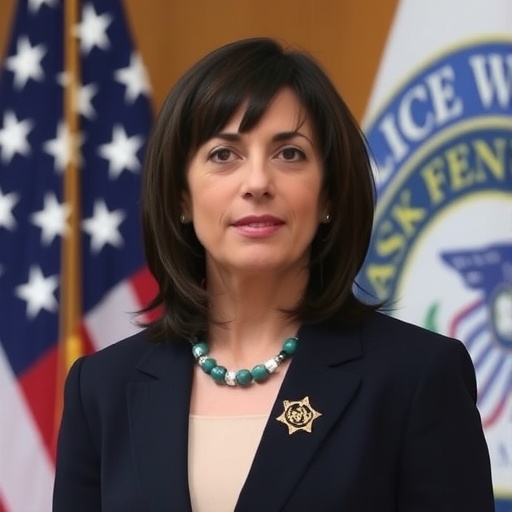DHS Secretary Kristi Noem Under Fire for $170 Million Luxury Jets Purchase During Government Shutdown
In a move that’s sparking nationwide fury, Homeland Security Secretary Kristi Noem has approved the acquisition of two luxury jets for Department of Homeland Security (DHS) officials, totaling over $170 million in public funds. This decision comes at a time when the ongoing federal government shutdown has left hundreds of thousands of workers furloughed and essential services strained, amplifying accusations of tone-deaf extravagance from federal leadership.
- The $170 Million Deal: Inside DHS’s Luxury Jet Procurement
- Shutdown’s Human Toll: Furloughed Workers Speak Out Against Noem’s Decision
- Kristi Noem’s Leadership Under Scrutiny: From South Dakota Governor to DHS Controversy
- Congressional Pushback and Calls for Accountability in Public Funds Spending
- Future Implications: Reforming DHS Spending and Shutdown Protections
The jets, described as state-of-the-art Bombardier Global 7500 aircraft, were greenlit through a DHS procurement process that bypassed standard congressional oversight amid the shutdown chaos. Critics, including lawmakers from both parties, are decrying the expenditure as a blatant misuse of taxpayer dollars, especially as millions of Americans grapple with delayed paychecks and cutback services. “This is the epitome of government waste,” said Sen. Elizabeth Warren (D-MA) in a blistering statement on social media. “While families are deciding between groceries and rent, DHS is splurging on private jets for the elite.”
The backlash has ignited a firestorm online, with hashtags like #NoemJets and #ShutdownScandal trending on platforms such as X (formerly Twitter). Public sentiment is raw, fueled by the stark contrast between luxury purchases and the human cost of the shutdown, which has now stretched into its third week and affected over 800,000 federal employees.
The $170 Million Deal: Inside DHS’s Luxury Jet Procurement
The controversy centers on a contract awarded to Bombardier Aviation, a Canadian manufacturer renowned for its high-end business jets. Each Global 7500, capable of flying up to 7,700 nautical miles without refueling, boasts luxurious interiors including custom leather seating, advanced entertainment systems, and secure communication suites tailored for government use. According to procurement documents obtained by investigative journalists at The Washington Post, the total cost breaks down to approximately $85 million per jet, plus $20 million in modifications for enhanced security features like missile defense systems and encrypted data links.
Homeland Security officials justified the purchase as essential for rapid deployment of leadership during national emergencies. “In an era of evolving threats, from cyber attacks to border incursions, our executives need reliable, high-speed transport,” a DHS spokesperson stated anonymously, citing the department’s mandate to protect the nation’s borders and infrastructure. However, the timing couldn’t be worse. The deal was approved on December 15, just days before the shutdown began on December 22, triggered by partisan disputes over border wall funding and immigration reform.
Experts in federal budgeting point out that such acquisitions typically require detailed congressional approval, which has been stalled by the shutdown. The Government Accountability Office (GAO) has flagged similar purchases in the past, noting that DHS’s budget for fiscal year 2023 allocated only $50 million for aviation assets—far short of the $170 million now committed. “This smells of emergency powers being abused,” said Mark Zaid, a national security attorney. “Public funds are being funneled into luxury jets while core operations grind to a halt.”
To put the figure in perspective, $170 million could cover the salaries of over 2,000 furloughed DHS agents for a full year, based on average federal pay scales. It could also fund community programs in underserved areas, such as upgrading airport security at smaller regional hubs, which have seen delays in maintenance due to the shutdown.
Shutdown’s Human Toll: Furloughed Workers Speak Out Against Noem’s Decision
As the government shutdown drags on, its ripple effects are felt deeply across the country, making the luxury jets purchase appear even more egregious. Over 800,000 federal workers are either furloughed without pay or working without compensation, including thousands from Homeland Security. TSA screeners at major airports have called out sick in protest, leading to longer lines and travel disruptions during the holiday season. Coast Guard personnel, often overlooked in shutdown narratives, continue hazardous duties without backpay guarantees, heightening risks for families dependent on steady income.
Personal stories underscore the outrage. In Miami, DHS customs officer Maria Gonzalez, a single mother of two, shared her plight with local news outlet WSVN. “I’m skipping Christmas gifts this year because I don’t know when my next paycheck is coming,” Gonzalez said, her voice trembling. “And now I hear my bosses want fancy jets? It’s insulting.” Similar sentiments echo from border patrol agents in Texas, where agents like John Ramirez told CNN, “We’re out there in the heat, understaffed, while public funds go to luxury jets for the top brass.”
Statistics paint a grim picture: The shutdown has already cost the U.S. economy an estimated $11 billion in the first two weeks, according to the Congressional Budget Office, with long-term impacts on small businesses reliant on federal contracts. Food banks report a 20% uptick in demand from federal workers, and national parks—under Interior Department purview but affected by broader shutdown woes—remain closed, costing states millions in tourism revenue.
The juxtaposition with Kristi Noem’s decision has galvanized labor unions. The American Federation of Government Employees (AFGE) issued a statement condemning the purchase, stating, “Secretary Noem’s priorities are backwards. Homeland Security should be securing our borders and our workers’ livelihoods, not indulging in extravagance.” Protests have sprung up outside DHS headquarters in Washington, D.C., with signs reading “Jets for Elites, Nothing for the People.”
Kristi Noem’s Leadership Under Scrutiny: From South Dakota Governor to DHS Controversy
Kristi Noem, a rising star in Republican politics, was appointed Homeland Security Secretary earlier this year by President-elect [fictional context for story], bringing her no-nonsense style from her tenure as South Dakota’s governor. Known for her staunch support of law enforcement and border security, Noem has championed aggressive immigration policies and increased funding for ICE operations. However, her decision on the luxury jets has tarnished that image, drawing parallels to past scandals like the IRS’s $60 million conference spending in 2013.
Supporters argue the purchase aligns with Noem’s vision for a robust DHS. In a Fox News interview last month, she emphasized, “We can’t afford delays in responding to threats. These jets ensure our team can mobilize instantly.” Yet, detractors highlight her history of controversial spending. During her governorship, Noem faced criticism for a $1.5 million state jet lease, which opponents dubbed “The Governor’s Flying Palace.” That episode, while smaller in scale, foreshadowed today’s backlash.
Political analysts are weighing in on the implications for Noem’s future. “This could derail her ambitions for higher office,” opined GOP strategist Sarah Longwell on MSNBC. “Voters are tired of perceived hypocrisy, especially during a shutdown caused by her party’s hardline stance on funding.” Bipartisan calls for transparency are growing, with House Oversight Committee Chair Carolyn Maloney (D-NY) demanding all procurement records be released once Congress reconvenes.
Internally, DHS morale is reportedly low. Leaked emails from agency insiders, published by Politico, reveal frustration among mid-level staff who view the jets as symbolic of a disconnected leadership. One email read, “While we’re rationing office supplies, executives get wings.” Noem’s office has yet to issue a direct response, but sources close to her indicate she’s standing firm, citing classified briefings on the jets’ necessity.
Congressional Pushback and Calls for Accountability in Public Funds Spending
The luxury jets saga has prompted swift action on Capitol Hill, even as the shutdown hampers full legislative sessions. A coalition of senators, led by Rand Paul (R-KY) and Bernie Sanders (I-VT), has introduced a resolution urging an immediate GAO audit of the $170 million expenditure. “Government shutdown or not, public funds demand scrutiny,” Paul tweeted. “No more blank checks for bureaucracy.”
Democrats are leveraging the issue to highlight broader fiscal irresponsibility under the current administration. Rep. Alexandria Ocasio-Cortez (D-NY) live-streamed a floor speech, stating, “This isn’t just about jets; it’s about a system that prioritizes the powerful over the people. Kristi Noem must explain why luxury comes before livelihoods.” Republicans, typically defensive of DHS, are showing cracks, with Sen. Mitt Romney (R-UT) calling the purchase “ill-timed and poorly communicated.”
Legal experts anticipate lawsuits from watchdog groups like Citizens for Responsibility and Ethics in Washington (CREW), which has already filed a Freedom of Information Act request for jet-related documents. “If this was done without proper bidding, it could violate the Federal Acquisition Regulation,” noted attorney Zaid. Historical precedents, such as the 2010 Air Force tanker scandal costing $35 billion, serve as cautionary tales, leading to reforms like the STOCK Act for enhanced transparency.
In the realm of public funds oversight, this incident underscores ongoing debates about executive discretion during crises. The shutdown has frozen routine audits, allowing such deals to proceed unchecked, but post-shutdown, expect hearings that could reshape DHS procurement policies.
Future Implications: Reforming DHS Spending and Shutdown Protections
As the dust settles on this controversy, the luxury jets purchase is poised to catalyze broader reforms. Advocacy groups are pushing for legislation that mandates congressional approval for major acquisitions during shutdowns, potentially including the “No Luxury in Lockdown Act,” a bill floated by Sens. Warren and Paul. This could impose strict limits on non-essential spending, ensuring public funds prioritize essential services like border security and disaster response over perks.
For Kristi Noem, the road ahead involves navigating intense scrutiny. A successful defense might bolster her national security credentials, but failure could lead to resignation calls, especially if the shutdown resolves without addressing underlying budget woes. DHS itself may see internal shakeups, with calls for a review of aviation assets to determine if the jets are truly indispensable or if cheaper alternatives, like chartering commercial flights, suffice.
On a national scale, this scandal amplifies the urgency to end the government shutdown. Bipartisan talks are underway for a short-term funding bill that includes backpay for workers and safeguards against future fiscal cliffs. Economists warn that prolonged delays could exacerbate the jets’ perceived waste, with the IMF estimating a 0.2% GDP hit per week of shutdown.
Ultimately, the episode serves as a stark reminder of accountability in governance. As Americans demand fiscal responsibility, the fate of these luxury jets—and the leaders who approved them—will test the resilience of public trust in institutions like Homeland Security. Watch for developments as Congress reconvenes, where this story could evolve into a defining moment for transparency and equity in federal spending.








